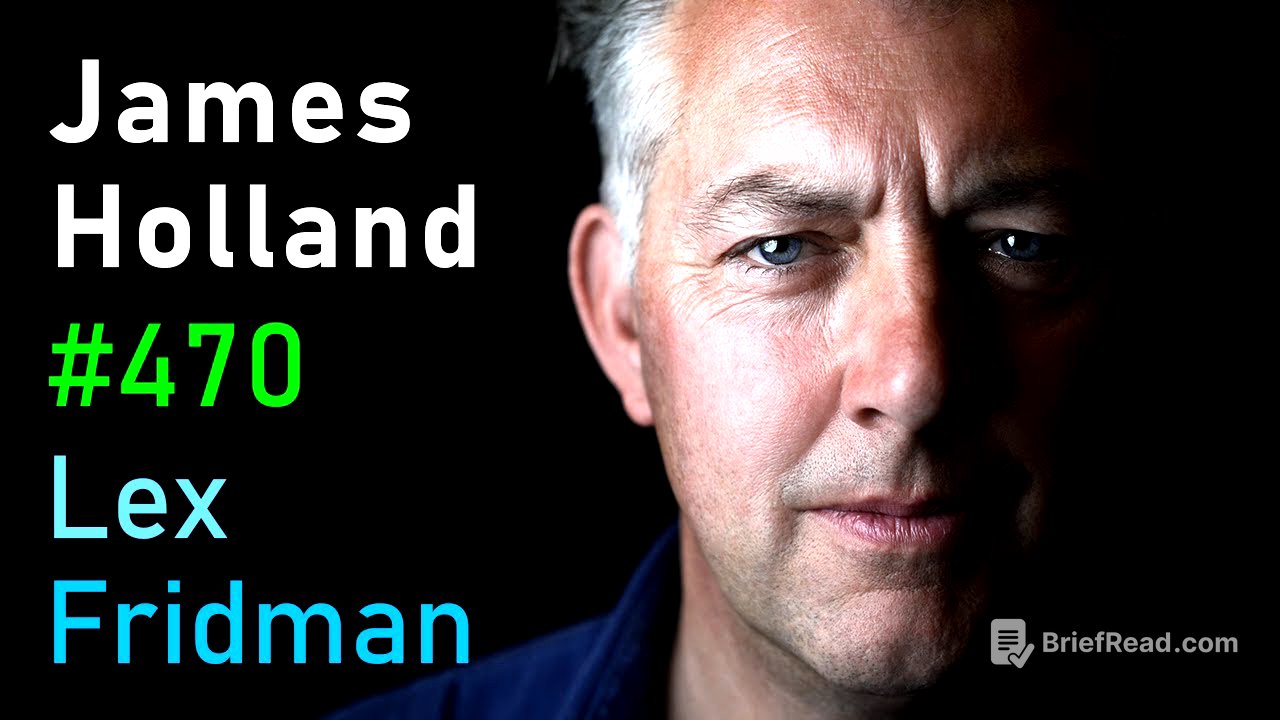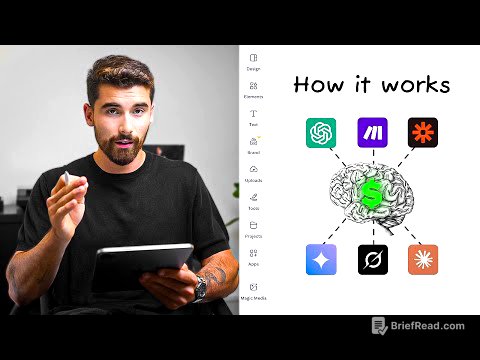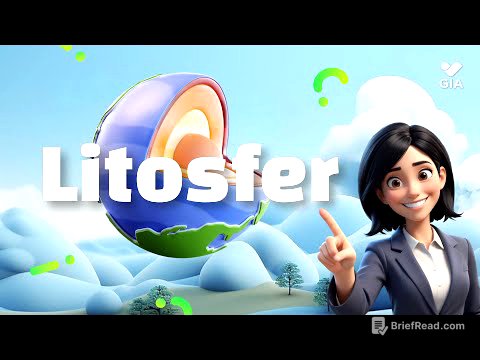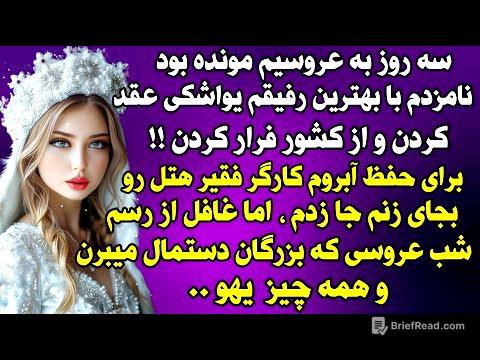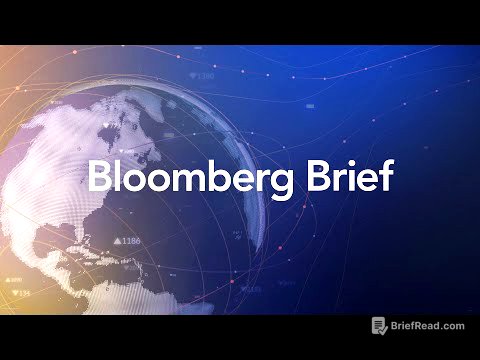TLDR;
This conversation with historian James Holland explores the multifaceted aspects of World War II, emphasizing its global nature, human drama, and the critical role of logistics and ideology. Holland argues that the war's scale and impact make it a unique catastrophe in modern history. He also touches on the rise of Hitler, the failures of appeasement, and the strategic and operational blunders that shaped the conflict.
- The global nature and human drama of World War II.
- The importance of logistics and operational art in military strategy.
- The role of propaganda and ideology in shaping public opinion and military decisions.
- The strategic errors and miscalculations that influenced the war's trajectory.
- The human cost and ethical dilemmas of warfare.
Episode highlight [0:00]
The speaker highlights the scale of D-Day, noting the 6,939 vessels, including 1,213 warships and 4,127 assault craft, along with 12,000 aircraft and 155,000 men landed or dropped from the air in a single 24-hour period, calling it phenomenal.
Introduction [0:26]
Lex Fridman introduces James Holland, a World War II historian and author, emphasizing his expertise on the Western Front and his attention to strategic, operational, tactical, technological, and human aspects of the war. Holland co-hosts the "We Have Ways of Making You Talk" podcast.
World War II [1:13]
James Holland reflects on World War II as the "single biggest catastrophe of modern history" due to its global scale, the deaths of over 60 million people from 60 countries, the destruction of cities, and mass displacement. He emphasizes the human drama inherent in war, pondering how individuals coped with separation and trauma. He shares the story of Sam Bradshaw, a tank man who, despite being wounded twice and finding his home unrecognizable after four years away, rejoined the army to fight against Nazism after witnessing the horrors of Belsen.
Lebensraum and Hitler ideology [11:11]
The discussion centers on the "hunger plan" and "Lebensraum" as central to Nazi ideology, rooted in Hitler's belief in a global Jewish-Bolshevik conspiracy. Hitler viewed the world in stark terms of "them" versus "us," with Aryans as the master race destined to dominate. This ideology fueled the drive to crush Bolshevism, expand German territory, exploit resources like Ukraine's breadbasket, and spread the Aryan race across Europe. Hitler's speeches, though nonsensical by modern standards, captivated audiences with their clear message of overcoming a global plot and reasserting Aryan dominance.
Operation Barbarossa [18:23]
Operation Barbarossa, the invasion of the Soviet Union, was deeply intertwined with Nazi ideology, not pragmatic strategy. Despite warnings that the operation was doomed due to insufficient motorization and logistical challenges, Hitler pressed forward, driven by his ideological goals. The German army's reliance on a mechanized spearhead with a largely un-motorized support structure, coupled with the vast distances and scorched-earth tactics of the Red Army, led to the operation's eventual failure.
Hitler vs Europe [34:36]
The conversation shifts to comparing different nations' approaches to war, highlighting the importance of strategic, operational, and tactical levels of analysis. Britain, as an island nation, prioritized its navy, while the US initially had a small army due to its geographic advantages. Germany, in contrast, had a large army but faced logistical challenges due to its inefficient mechanized arm. Hitler's failure to understand his enemies' perspectives and his early military successes led him to overestimate his own genius and rush into Operation Barbarossa.
Joseph Goebbels [56:22]
The discussion highlights France's failure to capitalize on Germany's weakness during the invasion of Poland due to political division, risk aversion, and military complacency. The speaker emphasizes the effectiveness of Joseph Goebbels' propaganda in creating a perception of an unstoppable Nazi force. Germany's sophisticated radio network, controlled by Goebbels, disseminated a consistent message of German superiority and the threat of a Jewish-Bolshevik plot, influencing public opinion and reinforcing Nazi ideology.
Hitler before WW2 [1:06:17]
Hitler's rise to power was facilitated by economic factors, including hyperinflation, the Treaty of Versailles, and the Great Depression. His ability to provide jobs and restore national pride, coupled with Goebbels' propaganda, garnered widespread support. The introduction of affordable radios allowed the Nazi message to reach every household, while the Hitler Youth indoctrinated young people with Nazi ideology. The speaker draws parallels to modern propaganda, noting the use of bots and social media to manipulate public opinion.
Hitler vs Chamberlain [1:11:12]
The conversation explores Hitler's violation of treaties and the appeasement policies of Britain and France. Despite rearming and remilitarizing the Rhineland, Hitler faced little resistance, emboldening him to further his expansionist goals. Chamberlain's attempts to negotiate with Hitler, culminating in the Munich Conference, are examined, with the speaker arguing that Chamberlain's actions were understandable given the political climate and Britain's unpreparedness for war.
Invasion of Poland [1:33:18]
The discussion shifts to the Molotov-Ribbentrop Pact and Hitler's invasion of Poland, which triggered declarations of war from Britain and France. Despite this, the speaker argues that France and Britain could have removed Hitler from power if they had attacked. The speaker notes that Hitler was not prepared for Britain and France declaring war on Germany.
Molotov–Ribbentrop Pact [1:37:55]
The Molotov-Ribbentrop Pact between Nazi Germany and the Soviet Union is discussed, highlighting the missed opportunity for Britain and France to form an alliance with the Soviet Union. The speaker suggests that Chamberlain should have gone to Moscow to negotiate with Stalin. The pact allowed Hitler to invade Poland without fear of Soviet intervention, while Stalin sought to regain territory and avoid immediate war.
Winston Churchill [1:45:56]
The discussion shifts to Winston Churchill's rise to power and his role in World War II. The speaker notes that Churchill was a towering figure in British politics, but he was also a controversial figure. The speaker also notes that Churchill was a strong advocate for rearmament and standing up to dictators. The speaker notes that Churchill's government fell on May 9, 1940, and he was replaced by Churchill.
Most powerful military in WW2 [2:09:56]
The conversation shifts to the state of the militaries in 1939. The speaker notes that Britain and the United States had the most powerful navies, while the Luftwaffer and the Imperial Japanese Navy were dominant in the air. The speaker also notes that the quality of the pilots in Japan was extremely high.
Tanks [2:32:18]
The discussion shifts to the Sherman tank, the mainstay of the Western Allied forces. The speaker notes that the Sherman tank was not as powerful as the Tiger tank, but it was more reliable and easier to maintain. The speaker also notes that there were far more Sherman tanks than Tiger tanks.
Battle of Stalingrad [2:42:17]
The discussion shifts to the Battle of Stalingrad, which the speaker calls the turning point of the war. The speaker notes that the Germans were winning themselves to death in 1941, and that by the beginning of December 1941, Germany was just not going to win. The speaker also notes that the Soviet Union was in a really bad situation, but that it was being helped out a huge amount by supplies from the United States and Britain.
Concentration camps [2:55:09]
The discussion shifts to the Holocaust, with the speaker noting that the Holocaust by bullets took place in the Eastern Front, while the concentration camps and extermination camps were located in Poland and the Soviet Union. The speaker also notes that the Nazi high command's response to Stalinrad was not to go we're screwed, but to double down.
Battle of Normandy [3:04:40]
The discussion shifts to the Battle of Normandy, which the speaker calls an unqualified success. The speaker notes that the Allies had total control of the air over Normandy, and that the mind sweeping operation was the biggest single mind sweeping operation of the entire war. The speaker also notes that the D-Day was the zenith of coal coalition warfare.
Lessons from WW2 [3:18:32]
The conversation concludes with a reflection on the lessons of World War II, emphasizing the dangers of allowing individuals to seize power and the importance of recognizing warning signs. The speaker stresses the fragility of peace and the need to cherish freedoms. He expresses hope in the goodness of humanity and the infinite capacity of the human brain to solve problems.
